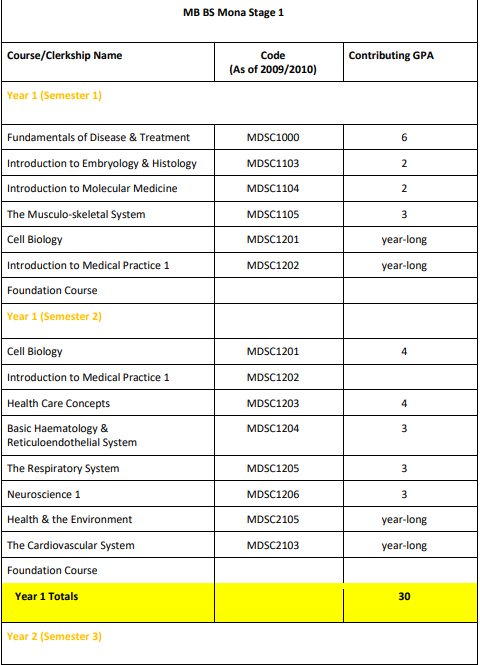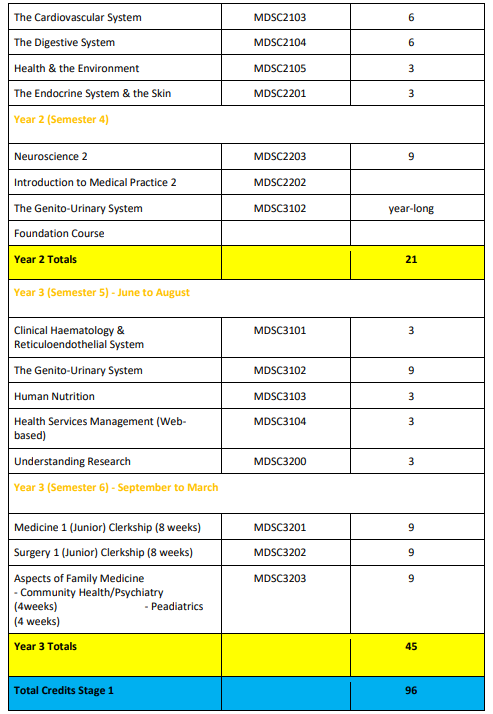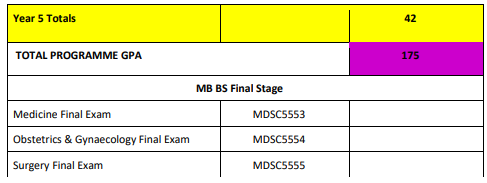- Home
- About
- Departments
- Programmes
- Research
- Resources
- Contact
- News

The core curriculum is made up of two Stages and comprises a series of required courses designed in a spiral fashion with gradually increasing emphasis on clinical application of the basic medical sciences. Stage 1 is done during the first two and half years, using a system-based approach, with courses designed to encourage integration between the basic medical science subjects and the clinical disciplines. Courses covering basic health care concepts and the individual’s relationship with the environment and community are also taught in the first three years along with a basic course in research methods. These courses are followed in the fourth and fifth years by practical exposure to the delivery of health care in community settings. Students must be successful in all Stage 1 courses before moving on to Stage 2 which has a stronger clinical focus. During the final two years, students rotate through the main clinical disciplines, with emphasis on general training rather than on specialist hospital practice.
The first two years of the programme are fully semester based while the first semester in year three is extended using a portion of the summer vacation. The curriculum is structured so as to place emphasis on clinical skills training, an important strength of the UWI medical programme.
Stage 1: This stage spans 3 years (Year 1, Year 2, and Year 3). The courses in Stage 1 follow the regular UWI Semesters’ based approach. In this stage students are exposed to a number systems based courses, each employing a multidisciplinary approach to learning and aims to provide students with a comprehensive knowledge base of the structure and functioning of the human body systems and how these relate to each other in health and disease. Each course is delivered by a combination of didactic lectures and practical laboratory work with tutorials on areas of special interest, complexity or importance. Case-based studies are used to highlight basic science principles underlying clinical problems and students work in groups to discuss the cases under supervision of staff moderators. Stage 1 culminates with a series of Introductory Clerkships/rotating clerkships designed to hone basic clinical skills and to widen students’ diagnostic approach to patients, including appropriate use of investigative laboratory services.
● Junior Medicine
● Junior Surgery
● Aspects of Family Medicine (child health, psychiatry, community medicine)
During these rotations, students are assigned in small groups to individual clinical services and participate in patient care under the supervision of the academic and resident staff.
Stage 2: Students must successfully complete all Stage 1 courses in order to proceed to the final two years of their undergraduate programme. Stage 2 comprises the final two years (Year 4 and Year 5) and consists primarily of hospital based clerkships with at least one rotation in a rural community setting and a 5-week elective. In Year 4 students rotate through a series of specialty and sub-specialty disciplines. The emphasis is on special examination techniques and modes of investigation. In support of this, students also spend ten weeks in the laboratory disciplines under supervision of the Departments of Pathology and Microbiology. The final year (Year 5) of training is designed to prepare students for their internship. A series of clerkships in core disciplines provides students with experience in the overall care and follow-up of patients with common and important conditions. Students participate in all the activities of the clinical service to which they are attached and much of their learning takes place during informal bedside teaching. Attention is paid by tutors to appropriate attitudes and behaviour as well as clinical competence. When students complete all of the required rotations satisfactorily, the programme concludes with the sitting of the written and clinical components of the final MB.BS examination. At this time, award of the MB.BS Degree from the University of the West Indies entitles the graduate to provisional registration in the health services of most English speaking Caribbean territories. Provisional registration (Internship) is a limited licence to practise under supervision and graduates may only undertake work in posts recognized for this purpose. Satisfactory completion of the pre-registration period entitles graduates to full registration and a licence to practise medicine independently within the English speaking Caribbean and/or to pursue further postgraduate training.



